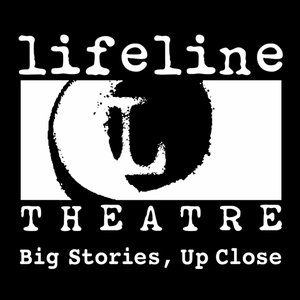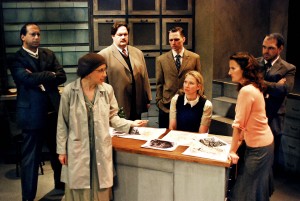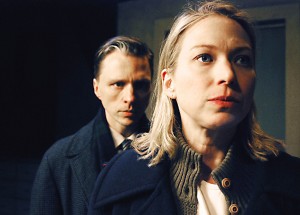THE ACTING FILLS YOU UP BUT THE
ADAPTATION LEAVES YOU HUNGRY FOR LESS
Elise Blackwell’s slender 2003 novel Hunger tells the harrowing story of a group of Russian scientists trying to survive the siege of Leningrad during World War II. Blackwell’s novel has been adapted into a drama receiving its world premiere at the Lifeline Theatre. The play is grim, bleak, and at 2 ½ hours, 30 minutes too long. The acting is outstanding but the adaptation ultimately becomes a very long sit for the audience.
Most of the action is confined in a laboratory in Leningrad (now St. Petersburg), where a group of dedicated food scientists is researching improved agricultural methods that will allow farmers to grow crops abundantly and efficiently enough to feed the sprawling Russian population. The scientists face daunting obstacles. The German armies are approaching the city and will ultimately lay siege to Leningrad for almost three years, inflicting catastrophic suffering on the people, who died by starvation, cold, and disease. The lab’s work is further complicated by interference from the brutal Russian establishment.
The scientists assume the role of caretakers to protect collections of precious, rare seeds that could lay the foundation for Russia’s agricultural salvation. Gradually, the initial group of seven scientists withers away through illness, the violence of the war, and arrests by the dreaded KGB. At the end of the play, only two scientists remain, suffering from survivor’s guilt because they endured while so many colleagues fell, and facing the subtle accusations of Russians who wonder what the survivors did to make it through to the end of the war.
Chris Hainsworth’s adaptation tries to explore the moral dilemmas of the scientists. Those valuable seeds may feed future Russian generations but they can also sustain life for the starving scientists. Which comes first, the obligations to posterity or the obligation to stay alive in the present? It’s a valid and unsettling question that the play dilutes by meandering into distracting side matters, like when the narrative suddenly goes into flashbacks that are confusing and extraneous. The seven scientists are an admirable lot, but we never get to know them as individuals and thus their fates don’t inspire as much sympathy and emotion on the personal level as they deserve.
The most dramatically viable character in Hunger is Trofim Lysenko, a real-life biologist who led Russia down the wrong path in agriculture with his bogus theories (thereby setting Soviet science back a generation in the study of genetics). As persuasively played by Peter Greenberg, Lysenko is a smarmy, power hungry, lecherous villain and the play is at its most audience-involving when he is on stage. Otherwise the play drones along under Robert Kauzlaric’s glacial paced direction, dwindling to tiresome wordiness in its final scenes.
The scenic design by Jessica Kuehnau captures the dreary utilitarian nature of the science lab with its many drawers that house the crucial seeds, but the restriction of the action to the science lab undercuts the impact of the horrors of the siege beyond the lab walls. The scientists are hungry but they are decently dressed (Joanna Melville designed the costumes) and obviously have access to some food. The play does attempt to heighten the horrors of the siege by showing residents dragging the wrapped corpses of the dead through the frozen streets and even three women fatally attacking a man to represent how the ghastly living conditions had reduced the people to barbarism. Overall, the misery of the siege is muted by the comparative safety of the lab, that is, until the feared knock on the door announces arrival of the KGB with orders to arrest a scientist on some trumped-up charge.
The character with the most stage time is Ilya, a scientist who never came into focus for me as a character. Ilya is an honorable man forced to do dishonorable things under the pressure of both the inhuman conditions of the siege and Russian oppression – he is neither enemy nor hero. In spite of a fine performance by John Henry Roberts, his moral presence isn’t sufficiently defined.
The entire ensemble, several playing multiple roles, is first rate, humanizing their characters when the script allows. Kendra Thulin is especially good as Ilya’s recklessly brave wife. Christopher Walsh is fine as the laboratory director who fails to recognize and protect his people from the German disaster approaching from the outside and his own brutal government from within. Dan Granata is outstanding as the scientist who starts out angry and bitter and ends up a docile victim of Soviet brainwashing. Katie McLean Hainsworth does superior double duty, first as the most clear-sighted of the scientists and then as a Lysenko assistant with her eye always on the main chance. Jenifer Tyler is the spunky, cynical scientist ultimately broken by the brutality of the siege and bureaucratic hostility.
Kevin Gawley is the lighting designer and Andrew Hansen contributed the sound design and original music.
Possibly the novel, which received rave reviews, does not lend itself to dramatization. Subtleties of personality may be easier to create on the printed page than on the stage. The procession of cruelties, miseries, and sufferings wears on a live audience, especially when there are an insufficient number of characters to stir the spectator dramatically and theatrically. Regrettably, in spite of the integrity of the project, the commitment of the performers, and the importance of the subject matter, I ended up bored.
photos by Suzanne Plunkett
Hunger
Lifeline Theatre Company
ends on March 25, 2012
for tickets, visit Lifeline
for more shows, visit Theatre in Chicago



